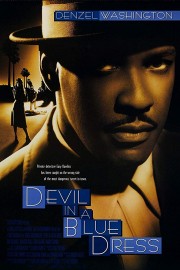Devil in a Blue Dress
At a point when Denzel Washington was at one of his most powerful and substantial moments as a box-office draw, audiences failed him by not warming up to “Devil in a Blue Dress.” Consider me one of those- I missed it in theatres, and thus, I am responsible for some of its failure at the box-office. When I did see it on video, I saw what I was missing, and realized what we missed out on- Denzel could have had a franchise to himself much sooner.
Carl Franklin’s 1995 film noir is based on a novel by Walter Mosley, one of many the author wrote about Easy Rawlins, a black private detective in California who not only has to deal with the troubles a Sam Spade or Phillip Marlow had, but had to do it in an era where racism was out in public, without shame; meaning that, if a white woman goes missing, or a white man gets killed, suspicions inevitably fall across racial lines. “Devil in a Blue Dress” is Easy’s origin story; he doesn’t start out the film as a private dick, but by the end, he has a reputation as someone who can navigate those dicey waters.
Carl Franklin was a filmmaker on the rise when “Devil in a Blue Dress” came out, after his 1992 film, “One False Move,” put him on the map as a director after an acting career. He has had a few other features since 1995, but most of his work has come directing television after his second collaboration with Washington, 2003’s “Out of Time.” “Devil in a Blue Dress” should have been the start of a franchise for he and Denzel, because it’s as smart, confident and entertaining as any crime drama that came out at the time, and as substantial as any of the great film noirs to come out over the years, including “Chinatown” and “L.A. Confidential.”
Easy Rawlins doesn’t start “Devil in a Blue Dress” as a detective. It’s 1948 Los Angeles, and he’s made a life for himself that includes owning his own house after moving from Texas. Unfortunately, he was just fired from his job, and he’s about to have trouble making mortgage payments. Opportunity walks in the door of the bar he’s drinking at, though, when a white man named Albright (Tom Sizemore) wants to talk to him about finding a woman. The woman in question is Daphne Monet (Jennifer Beals), although Albright calls her Dahlia. She has a proclivity towards black men, and Albright thinks Easy, on the recommendation of the bartender, is the man for the job. For Easy, he takes it for the money, but he’s going to get more than he bargained for as the search leads him down a rabbit hole of murder, blackmail, and kidnapping.
I think one of my favorite parts of “Devil in a Blue Dress” as I watched it for the first time in about 20-plus years was how it develops Easy’s life in the black neighborhood he lives in. We see him interact with his neighbors, and take it easy in his neighborhood, and there’s glimpses of him looking after his neighbors in the form of running off a guy who wants to cut down the trees. Washington’s voiceover serves the same purpose of any narration in a film like this- it’s a running commentary of the events, and the way Washington delivers it is one of many reasons we missed out on something good by not getting a franchise of Easy Rawlins films starring him and written and directed by Franklin.
If you’ve seen any amount of film noir over the years, the beats Franklin hits on in this film will not be a surprise to you. You have two sides playing Easy into the middle; you have the femme fatale (whom Beals plays well, if not terribly memorably- Lisa Nicole Carson as Coretta James, Daphne’s friend and a lover of Easy’s, is much more impactful); and you have a friend of the protagonist’s who can assist in the case. That friend is Mouse, and he is played marvelously by Don Cheadle, who has an easy rapport with Denzel that makes their scenes in the back half of this film come off authentically and make the way this film wraps up wildly entertaining to watch. To think we could have had plenty more movies with Denzel and Cheadle, two of the best actors of their generation, solving mysteries if only audiences had latched on to Franklin’s film the way many of those that saw it did.
Franklin not having directed anything for a major studio since 2003 is criminal. Of course, with the sea change that has happened in cinema the past 15 years, it’s not that surprising, but the director got fantastic cinematography out of Tak Fujimoto, and a great throwback score by Elmer Bernstein, for a movie that feels like it meant something to him while still being a rock-solid genre film. It’s not his only great film he made, but it’s probably the one that shows what movies have lost by marginalizing the mid-budget films like this one. Just one more reason to appreciate what he did here.










